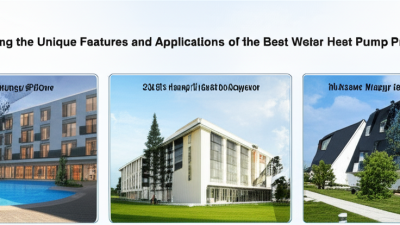Exploring the Unique Features and Applications of the Best Water Heat Pump Products
In recent years, the demand for energy-efficient heating solutions has surged, prompting increased interest in Water Heat Pumps, which are heralded for their ability to provide sustainable heating and cooling. According to the International Energy Agency (IEA), the global heat pump market is expected to grow significantly, with a projected increase in installations of 10% annually between 2020 and 2025. Water Heat Pumps stand out for their unique characteristics, such as utilizing renewable energy sources, which can lead to a reduction in energy consumption by up to 60% compared to traditional heating systems. As homeowners and businesses seek to minimize their carbon footprint and operational costs, choosing high-quality manufacturers of Water Heat Pumps becomes crucial. This blog will delve into the distinct features and diverse applications of the best Water Heat Pump products, guiding you through the selection of a reliable manufacturer in this thriving industry.

Understanding the Types of Water Heat Pumps Available in the Market
As the demand for energy-efficient solutions rises, understanding the types of water heat pumps available on the market becomes essential for homeowners looking to optimize their heating systems. Water heat pumps, primarily categorized into air-source, water-source, and geothermal models, offer varying efficiencies and applications tailored to different residential needs. According to recent market research, the North American residential hydronic heater market is projected to grow significantly, from USD 117.96 million in 2025 to USD 157.64 million by 2032, reflecting a compound annual growth rate (CAGR) of 4.23%.
The global heat pump water heater market is also witnessing exponential growth, particularly in Europe, where the market size is expected to exceed USD 1.2 billion in 2023. This growth is attributed to an increasing demand for high-efficiency heating systems that cater to year-round operational effectiveness. Various segmentations, such as installation type—split systems versus packaged systems—capacity ranging from small (5 kW) to large (>15 kW), and applications across industries underscore the versatility and efficiency of water heat pumps, which are set to become pivotal in the green low-carbon industry. With these innovative systems on the rise, the future of residential heating looks promising as energy sustainability takes precedence.
Key Features that Set the Best Water Heat Pumps Apart from the Competition
When it comes to selecting the best water heat pump, understanding the key features that differentiate top products from the rest is essential. Efficient energy use is one of the standout characteristics of premium water heat pumps. Models that leverage advanced inverter technology can adjust their operation based on demand, minimizing energy consumption while maintaining optimal performance. This feature not only contributes to lower utility bills but also supports sustainability efforts.
Another significant feature to consider is the versatility of the heat pump's applications. The best water heat pumps are designed to work seamlessly in various environments, whether for residential heating, pool heating, or industrial applications. Their ability to adapt to different scales and settings makes them a flexible solution for many users.
Tip: When evaluating different models, look for certifications and ratings that demonstrate energy efficiency and reliability. Additionally, take note of the warranty and customer support offered, as these aspects can greatly influence your long-term satisfaction with the product.
Innovative Applications of Water Heat Pumps in Residential and Commercial Settings
Water heat pumps are revolutionizing the way we manage heating and cooling in both residential and commercial settings. In homes, these innovative systems efficiently extract heat from water sources, providing a sustainable solution for domestic hot water and space heating. For instance, a water heat pump can utilize a nearby lake or well as a heat source, drastically reducing energy costs while minimizing environmental impact. This technology not only lowers monthly bills but also boosts the home’s energy efficiency, making it an attractive option for eco-conscious homeowners.
In commercial applications, water heat pumps are increasingly favored for their versatility and reliability. They can be employed in various settings, such as hotels, sports complexes, and office buildings, to maintain optimal indoor climates. By leveraging water as a heat transfer medium, these systems provide consistent heating and cooling solutions while enabling significant savings on energy consumption. The adaptability of water heat pumps allows businesses to integrate them into existing infrastructure, enhancing both their environmental credentials and operational efficiency. As the demand for sustainable technology grows, water heat pumps stand out as a forward-thinking choice for modern heating and cooling needs.
The Role of Quality Manufacturing in China's Water Heat Pump Industry
In the rapidly evolving water heat pump industry, the role of quality manufacturing is crucial, particularly within China's vast market. Manufacturing practices that emphasize precision engineering and the use of durable materials not only enhance the efficiency of water heat pumps but also extend their lifespan. Companies that prioritize quality control throughout the production process can better meet the stringent demands of energy efficiency and environmental standards, which are increasingly important factors for consumers.
Tip: When selecting a water heat pump, always check the manufacturer's commitment to quality assurance. Look for certifications, as they indicate adherence to industry standards which can significantly impact performance and reliability.
Furthermore, innovation in manufacturing techniques plays a vital role in optimizing the performance of water heat pumps. The adoption of advanced technology, such as automated production lines and smart testing equipment, allows manufacturers to produce highly efficient products that cater to diverse applications—from residential heating to industrial use. Enhanced manufacturing also supports the scalability of water heat pumps, making them more accessible for various consumers.
Tip: Consider researching the latest advancements in water heat pump technology, as this knowledge can help you choose a product that not only matches your needs but also reflects the best in current manufacturing standards.
Exploring the Unique Features and Applications of Water Heat Pumps
This chart presents key metrics related to water heat pumps, such as energy efficiency, installation cost, average lifespan, and market share, highlighting the uniqueness and applicability of these systems in the industry.
Future Trends in Water Heat Pump Technology and Global Export Opportunities
As we venture into the future, the water heat pump technology landscape is undergoing significant transformations that promise to reshape the global market. The increasing focus on sustainability and energy efficiency is driving innovations in this field. Manufacturers are now producing units that not only deliver better performance but also adhere to stricter environmental regulations.
Enhanced designs incorporate smart technologies, allowing for better energy management and integration into renewable energy systems, thus making water heat pumps more appealing to eco-conscious consumers.
Simultaneously, global export opportunities for water heat pumps are blossoming. Countries with ambitious green initiatives are seeking efficient heating and cooling solutions, propelling demand for advanced water heat pump systems.
Regions like Southeast Asia and parts of Europe are witnessing a surge in adoption, as governments emphasize reducing carbon footprints and improving energy efficiency in residential and commercial settings.
Companies that pivot towards developing innovative, user-friendly, and efficient water heat pumps stand to gain a competitive edge in this emerging market, meeting the demands of an increasingly environmentally aware global customer base.



